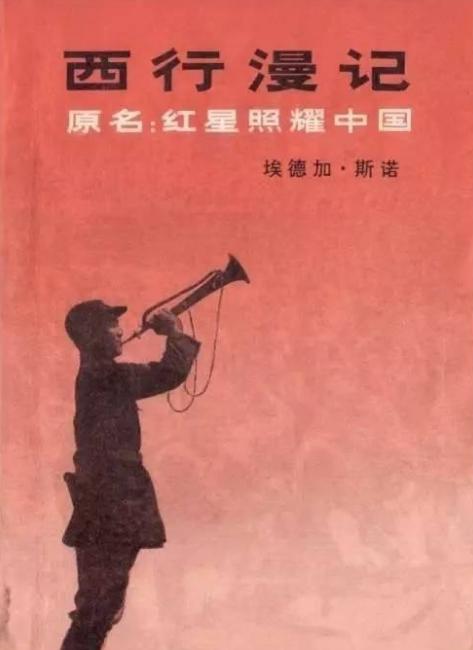Chairman Mao once said that Snow was an old friend of the Chinese people. In 1936, Snow became the first Western journalist to arrive in northern Shaanxi to interview Chairman Mao. During the 92 days in northern Shaanxi, Snow ate and lived with the Soldiers of the Red Army, had in-depth contact with the Red Army and Mao Zedong, Zhou Enlai and other Red Army leaders, and returned to write the book "Red Star Shines on China" that shocked the Western world.

It is not an exaggeration to say that this book was completed at the risk of Edgar Snow's life. Because the Long March had just ended and the Red Army was seriously injured, Chiang Kai-shek, while creating false public opinions at home and abroad about the Red Army's "green fangs" and "killing people and setting fires," wanted Mao Zedong and Zhu De with a high bounty of 250,000 oceans. And "Red China" Yan'an was even more surrounded by Kuomintang troops and spies.
Born in 1905 in Kansas, Missouri, to a family of ordinary factory owners, Edgar Snow's father wanted his son to run the family's printing house, but Snow went against his father's wishes to become a journalist. After graduating from the University of Missouri's Department of Journalism, Snow crossed the ocean to China in April 1933 out of curiosity and love for China.
After Edgar Snow came to China, he worked as a reporter for the Miller's Review in Shanghai, went to the northeast and Shanghai and other fronts to conduct interviews, and published a collection of reports and newsletters, "Far East Front", announcing to the world the ferocity of Japanese fascism and the heavy disasters suffered by China. At the beginning of 1935, Snow accepted an invitation from Yenching University to come to Beiping as a special lecturer at the School of Journalism, teaching journalism courses.
In his days in China, Snow saw more than once that the Nationalist government's provocations against the Japanese were only tolerated. In the "12.9" and other movements organized by the Underground Party in Beiping, Snow deeply felt that the Chinese Communist Party was an important force to save China.
Snow has also been wondering: Is the Chinese Communist Party and the Red Army under its leadership really "green-faced fangs" and "killing people and setting fires" as described by the "Nanjing Government"? If so, then why did thousands of people risk execution to join the Communist Party and join the Red Army?
How to solve this series of questions, Snow came up with the idea of going to northern Shaanxi for field interviews, to reveal the real situation there and publish it to the world. However, at that time, the Nationalist government strictly prohibited foreigners from approaching the Soviet zone, and it was not easy to arrive safely. At this time, Snow thought of Song Qingling, who had a close relationship with the Communists.
Snow and Song Qingling
What Snow did not expect was that he had just put forward his own ideas to Song Qingling, and Song Qingling said happily: I must help! It turned out that Song Qingling had previously been commissioned by the Shanghai underground organization to find two foreigners, a reporter and a doctor, to go to Yan'an to interview and treat. So, why did the CPC Central Committee have such a demand, and why did it still want to choose foreigners?
Chairman Mao knew that no chinese writer or journalist could achieve this goal. Because the Nationalist government will absolutely ban their speech, even the journalists themselves will invite the disaster of killing. Isn't Shi Liangcai, a giant in the Chinese newspaper industry and the founder of the "Declaration," assassinated by military command agents in 1934 because of his criticism of Chiang Kai-shek? So who comes to foreign journalists and doctors?
Chairman Mao thought of Soong Ching-ling, who had studied in the United States. In this way, after relaying it to northern Shaanxi through a secret radio station, Mao Zedong made a decision to allow the American journalist Edgar Snow to visit northern Shaanxi.
Late on the night of June 3, 1936, Snow boarded a westbound train and embarked on the most mysterious "Red China" trip of his journalistic career. After several weeks of mileage, Snow reached the security guard.
There is a section of road between Yan'an and Bao'an that belongs to the buffer zone between the Northeast Army and the Red Army, and no one sends it here, and no one picks it up there. Just when Snow was nervous, a horseshoe sound came, and then a bearded but very polite officer came in and greeted Snow. It was Zhou Enlai, who was in charge of receiving Snow. Snow quickly picked up the camera and froze this precious moment in history.
Zhou Enlai said to Snow straight away, I have received a report that you are a reliable journalist, friendly to the Chinese people, and that you can trust you to report truthfully, all this is enough, you are not a communist, this has nothing to do with us, you can report anything you see, we will give you all the convenience to visit the Soviet area.
Snow later recalled that he had prepared his actions to be restricted, but Zhou Enlai's words still surprised him. Later facts also proved that Zhou Enlai and the Communists had fully fulfilled their promises.